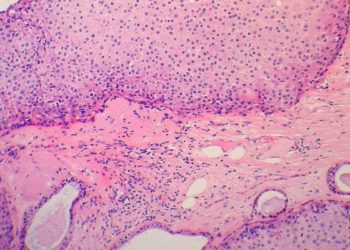2 Minute Medicine Rewind January 13-19, 2014
Image: PD/HSV-2
In this section, we will highlight the key high-impact studies, updates, and analyses published in medicine during the past week.
Calcium Density of Coronary Artery Plaque and Risk of Incident Cardiovascular Events
Coronary artery calcium (CAC) is measured by computed tomography (CT) and can be of strong predictive value for myocardial infarctions and incident cardiovascular disease (CVD). In this prospective multicenter cohort study, 3398 individuals with no known CVD were followed for a median of 7.6 years, and the relationship between both CAC volume and density with CVD was examined. During follow-up, there was a total of 265 CVD events. Using a multivariable model, the CAC volume score was independently associated with incident coronary heart disease (CHD) (HR of 1.81 per standard deviation, 1.6), with an annual absolute risk increase of 6.1 per 1000 person-years. A similar independent association was seen with CAC volume and CVD. Conversely, CAC density score showed an independent inverse association with CHD (HR of 0.73 per SD, .7), with absolute risk decrease of 5.5 per 1000 person-years. A similar relationship was seen for CAC density and CVD. At any level of CAC volume, CAC density was inversely and significantly associated with CHD and CVD risk, which may have merit for incorporation into risk algorithms.
Body-Mass Index and Mortality among Adults with Incident Type 2 Diabetes
Various studies have suggested that evidence that there is a decrease in mortality for select populations of overweight or obese. In this retrospective analysis of data from the Nurse’s Health Study (n= 8970) and Health Professional’s Follow-up Study (n=2457), investigators examined at the relationship between BMI and all-cause mortality in patients with type 2 diabetes and no incident cardiovascular disease or cancer. Normal weight (BMI 22.5 – 24.9) individuals had the lowest mortality rate over 15.8 years of follow-up compared to lower weight subsets: BMI 18.5 – 22.4 (HR 1.29) and higher weight subsets: BMI 25.0 – 27.4 (HR 1.12), BMI 27.5 – 29.9 (HR 1.09), BMI 30.0 – 34.9 (HR 1.24) and BMI >35 (HR 1.33). Notably, this represents a J-shaped association between BMI and all-cause mortality risk in this population. This study did not find evidence that overweight individuals at the time of diagnosis of type 2 diabetes had lower mortality than normal BMI subjects.
Antiphosopholipid syndrome (APS) is an autoimmune disorder in which antibodies to phospholipids can cause increased risk for thromboembolic events (deep vein thrombosis, strokes, and pulmonary emboli) and obstetric complications such as miscarriages and eclampsia. In this single center cohort study, 1313 women with a history of prior pregnancy loss were evaluated for antiphosopholipid antibody as well as other coagulation studies and followed for complications during pregnancy. Pregnant women who were antiphosopholipid antibody positive (n = 513) were started on standard prophylaxis (low molecular weight heparin and low dose aspirin), and a control arm of pregnant women without antiphosopholipid syndrome (n = 791) had no treatment. Even with medical therapy, the women with APS had a higher incidence of pulmonary embolism (14.7% vs. 5.9%, p < 0.001), HELLP syndrome (0.5% vs. 0.1%, p = 0.0041) and neonatal mortality (4.7% vs 1.4%). In women with a history of spontaneous abortion, women with APS also had a lower rate of live births (90.7% vs. 97.7%, p = 0.002). Despite medical treatment, women with APS have a more complicated obstetric course even compared to other women with a history of prior pregnancy losses.
Helicase–Primase Inhibitor Pritelivir for HSV-2 Infection
Pritelivir is a novel inhibitor of herpes simplex virus (HSV). In this randomized, double blinded multicenter trial, 156 HSV-2 positive patients were randomized to either oral pritelivir (5mg, 25mg, 75mg daily or 400mg weekly) or placebo for 28 days. The investigators found HSV shedding on 16.6% of days for patients on placebo vs. 18.2%, 9.3%, 2.1%, and 5.3% on different doses of pritelivir (5mg, 25mg, 75mg daily or 400mg weekly, respectively). The percentage of days with genital lesions was significantly reduced, from 9.0% in the placebo group to 1.2% in the group receiving 75 mg of pritelivir daily (RR, 0.13; 95% CI, 0.02 to 0.70) and the group receiving 400 mg weekly (RR, 0.13; 95% CI, 0.03 to 0.52). Pritelivir may be a viable choice in HSV prophylaxis.
There are many standards and inconclusive evidence regarding the best surveillance strategy for colorectal cancer recurrence following surgery for colorectal cancer. In this multicenter, randomized controlled trial, 1209 patients were randomized to scheduled blood measurement of carcinoembryonic antigen (CEA) (n = 300), computed tomography (CT) (n = 299), both CEA and CT (n = 302), or minimum follow-up (n = 301). Over an average of 4.4 years of follow-up, there was a statistically higher absolute rate of surgical treatment of recurrent in all three surveillance strategies (4.4% for CEA, 5.7% for CT alone, and 4.3% for CEA and CT) compared to minimum follow-up. However, the number of deaths was not significantly different in the combined intensive monitoring groups (CEA, CT, and CEA+CT; 18.2% [164/901]) vs the minimum follow-up group (15.9% [48/301]; difference, 2.3%; 95% CI, −2.6% to 7.1%). There does not appear to be a benefit in combining CEA and CT over each modality alone and there was not a statistically significant survival benefit to any strategy.
By David Ouyang
© 2012-2014 2minutemedicine.com. All rights reserved. No works may be reproduced without written consent from 2minutemedicine.com. Disclaimer: We present factual information directly from peer reviewed medical journals. No post should be construed as medical advice and is not intended as such by the authors or by 2minutemedicine.com. PLEASE SEE A HEALTHCARE PROVIDER IN YOUR AREA IF YOU SEEK MEDICAL ADVICE OF ANY SORT. Content is produced in accordance with fair use copyrights solely and strictly for the purpose of teaching, news and criticism. No benefit, monetary or otherwise, is realized by any participants or the owner of this domain.







